Cavendish Hall Hotel: IPRP System Advantages and Disadvantages
VerifiedAdded on 2019/12/03
|9
|2628
|500
Report
AI Summary
This report provides a comprehensive analysis of the Individual Performance Related Pay (IPRP) system implemented at Cavendish Hall Hotel, a four-star establishment. It begins with an introduction to IPRP, followed by a detailed examination of its advantages, such as improved employee motivation and streamlined reward structures, and disadvantages, including potential for team work neglect and increased competition. The report explores how IPRP can improve the hotel's performance, particularly in addressing declining occupancy rates and customer dissatisfaction. It also identifies barriers to the effective design and implementation of IPRP schemes, such as high costs and employee dissatisfaction, and suggests alternative reward approaches, including intrinsic and extrinsic rewards, and balance scorecards, that could complement or replace IPRP for enhanced employee motivation and organizational success. The report concludes with a summary of key findings and recommendations.

BUSINESS MANAGEMENT
Paraphrase This Document
Need a fresh take? Get an instant paraphrase of this document with our AI Paraphraser
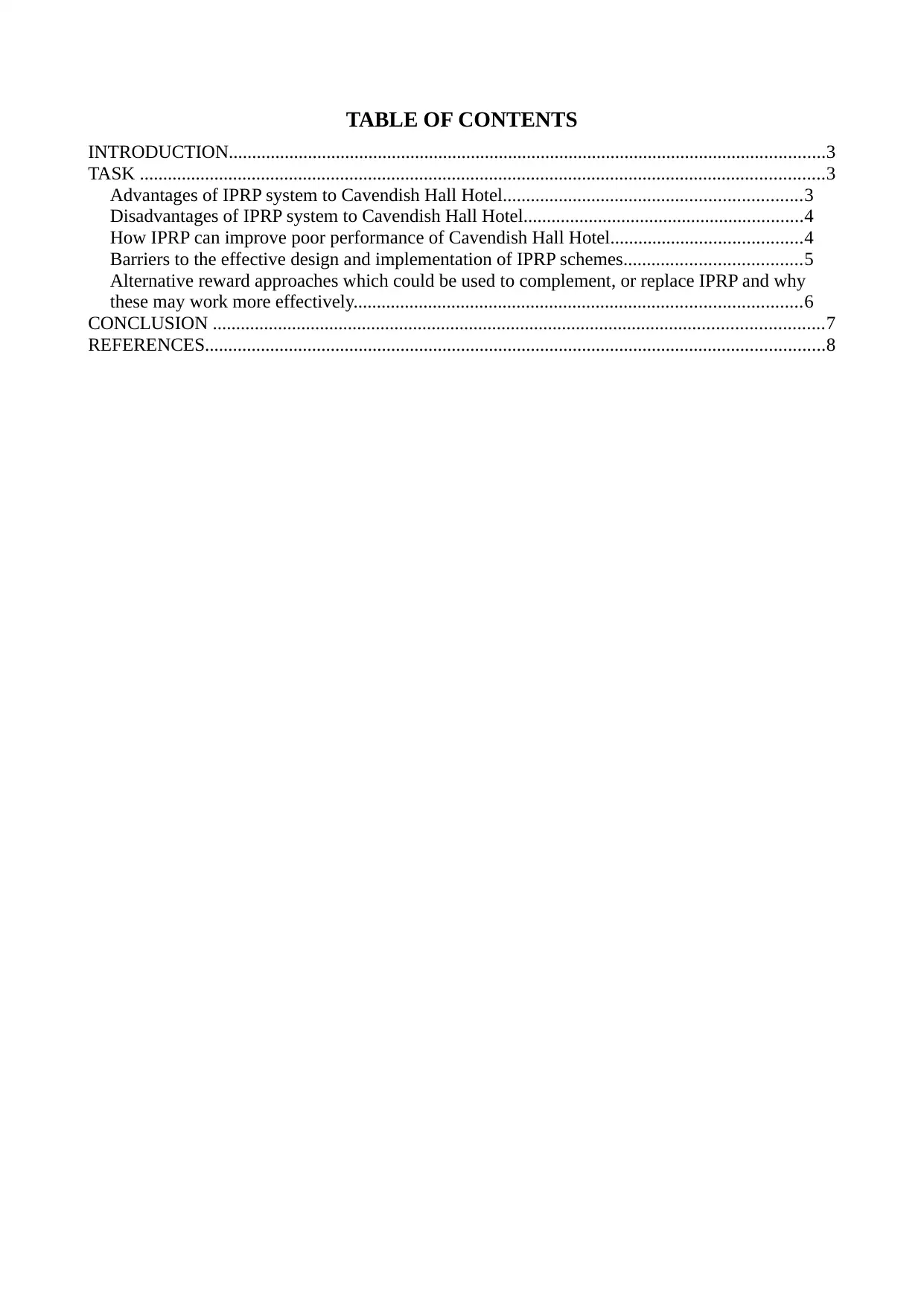
TABLE OF CONTENTS
INTRODUCTION................................................................................................................................3
TASK ...................................................................................................................................................3
Advantages of IPRP system to Cavendish Hall Hotel................................................................3
Disadvantages of IPRP system to Cavendish Hall Hotel............................................................4
How IPRP can improve poor performance of Cavendish Hall Hotel.........................................4
Barriers to the effective design and implementation of IPRP schemes......................................5
Alternative reward approaches which could be used to complement, or replace IPRP and why
these may work more effectively................................................................................................6
CONCLUSION ...................................................................................................................................7
REFERENCES.....................................................................................................................................8
INTRODUCTION................................................................................................................................3
TASK ...................................................................................................................................................3
Advantages of IPRP system to Cavendish Hall Hotel................................................................3
Disadvantages of IPRP system to Cavendish Hall Hotel............................................................4
How IPRP can improve poor performance of Cavendish Hall Hotel.........................................4
Barriers to the effective design and implementation of IPRP schemes......................................5
Alternative reward approaches which could be used to complement, or replace IPRP and why
these may work more effectively................................................................................................6
CONCLUSION ...................................................................................................................................7
REFERENCES.....................................................................................................................................8
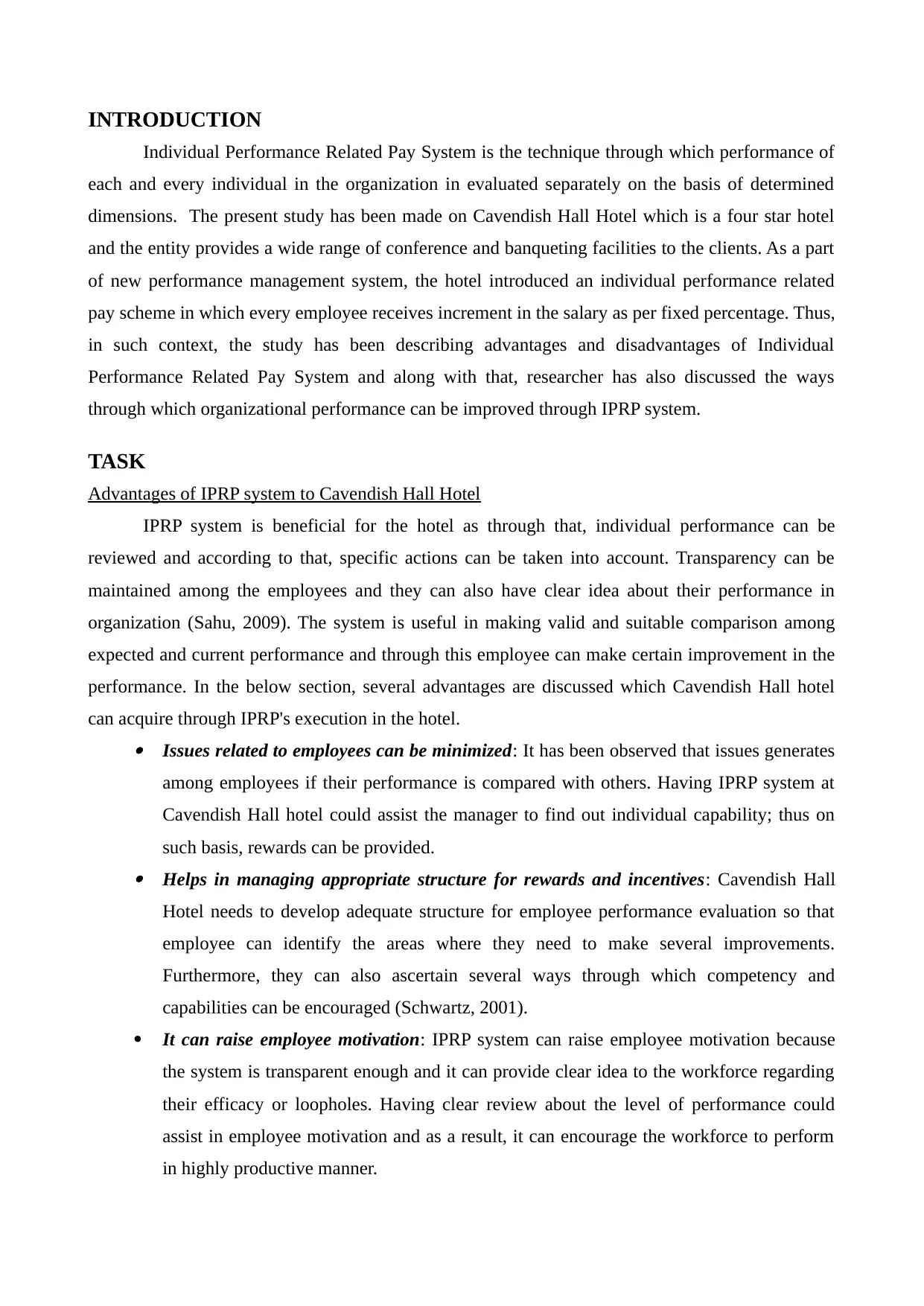
INTRODUCTION
Individual Performance Related Pay System is the technique through which performance of
each and every individual in the organization in evaluated separately on the basis of determined
dimensions. The present study has been made on Cavendish Hall Hotel which is a four star hotel
and the entity provides a wide range of conference and banqueting facilities to the clients. As a part
of new performance management system, the hotel introduced an individual performance related
pay scheme in which every employee receives increment in the salary as per fixed percentage. Thus,
in such context, the study has been describing advantages and disadvantages of Individual
Performance Related Pay System and along with that, researcher has also discussed the ways
through which organizational performance can be improved through IPRP system.
TASK
Advantages of IPRP system to Cavendish Hall Hotel
IPRP system is beneficial for the hotel as through that, individual performance can be
reviewed and according to that, specific actions can be taken into account. Transparency can be
maintained among the employees and they can also have clear idea about their performance in
organization (Sahu, 2009). The system is useful in making valid and suitable comparison among
expected and current performance and through this employee can make certain improvement in the
performance. In the below section, several advantages are discussed which Cavendish Hall hotel
can acquire through IPRP's execution in the hotel. Issues related to employees can be minimized: It has been observed that issues generates
among employees if their performance is compared with others. Having IPRP system at
Cavendish Hall hotel could assist the manager to find out individual capability; thus on
such basis, rewards can be provided. Helps in managing appropriate structure for rewards and incentives: Cavendish Hall
Hotel needs to develop adequate structure for employee performance evaluation so that
employee can identify the areas where they need to make several improvements.
Furthermore, they can also ascertain several ways through which competency and
capabilities can be encouraged (Schwartz, 2001).
It can raise employee motivation: IPRP system can raise employee motivation because
the system is transparent enough and it can provide clear idea to the workforce regarding
their efficacy or loopholes. Having clear review about the level of performance could
assist in employee motivation and as a result, it can encourage the workforce to perform
in highly productive manner.
Individual Performance Related Pay System is the technique through which performance of
each and every individual in the organization in evaluated separately on the basis of determined
dimensions. The present study has been made on Cavendish Hall Hotel which is a four star hotel
and the entity provides a wide range of conference and banqueting facilities to the clients. As a part
of new performance management system, the hotel introduced an individual performance related
pay scheme in which every employee receives increment in the salary as per fixed percentage. Thus,
in such context, the study has been describing advantages and disadvantages of Individual
Performance Related Pay System and along with that, researcher has also discussed the ways
through which organizational performance can be improved through IPRP system.
TASK
Advantages of IPRP system to Cavendish Hall Hotel
IPRP system is beneficial for the hotel as through that, individual performance can be
reviewed and according to that, specific actions can be taken into account. Transparency can be
maintained among the employees and they can also have clear idea about their performance in
organization (Sahu, 2009). The system is useful in making valid and suitable comparison among
expected and current performance and through this employee can make certain improvement in the
performance. In the below section, several advantages are discussed which Cavendish Hall hotel
can acquire through IPRP's execution in the hotel. Issues related to employees can be minimized: It has been observed that issues generates
among employees if their performance is compared with others. Having IPRP system at
Cavendish Hall hotel could assist the manager to find out individual capability; thus on
such basis, rewards can be provided. Helps in managing appropriate structure for rewards and incentives: Cavendish Hall
Hotel needs to develop adequate structure for employee performance evaluation so that
employee can identify the areas where they need to make several improvements.
Furthermore, they can also ascertain several ways through which competency and
capabilities can be encouraged (Schwartz, 2001).
It can raise employee motivation: IPRP system can raise employee motivation because
the system is transparent enough and it can provide clear idea to the workforce regarding
their efficacy or loopholes. Having clear review about the level of performance could
assist in employee motivation and as a result, it can encourage the workforce to perform
in highly productive manner.
⊘ This is a preview!⊘
Do you want full access?
Subscribe today to unlock all pages.

Trusted by 1+ million students worldwide
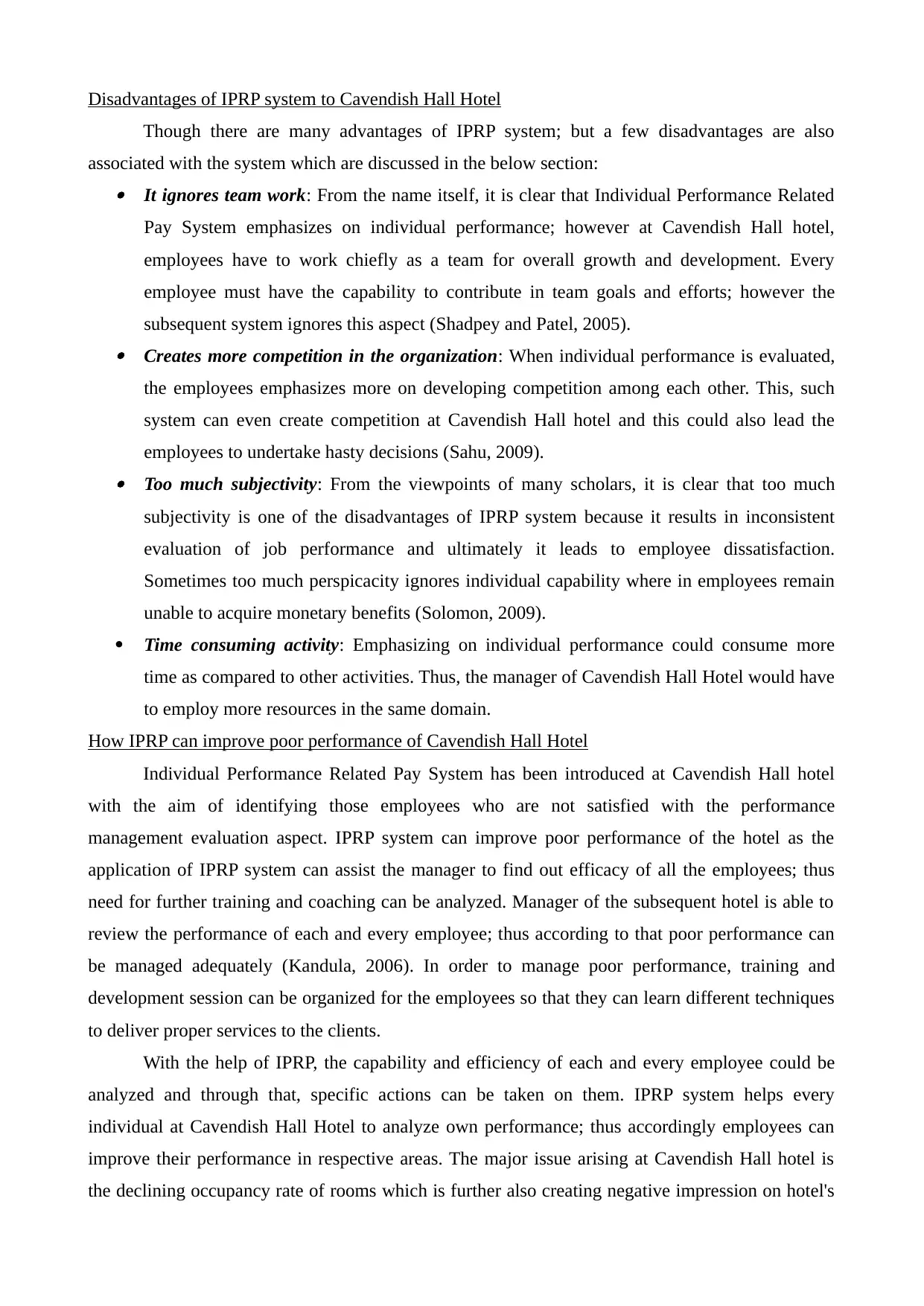
Disadvantages of IPRP system to Cavendish Hall Hotel
Though there are many advantages of IPRP system; but a few disadvantages are also
associated with the system which are discussed in the below section: It ignores team work: From the name itself, it is clear that Individual Performance Related
Pay System emphasizes on individual performance; however at Cavendish Hall hotel,
employees have to work chiefly as a team for overall growth and development. Every
employee must have the capability to contribute in team goals and efforts; however the
subsequent system ignores this aspect (Shadpey and Patel, 2005). Creates more competition in the organization: When individual performance is evaluated,
the employees emphasizes more on developing competition among each other. This, such
system can even create competition at Cavendish Hall hotel and this could also lead the
employees to undertake hasty decisions (Sahu, 2009). Too much subjectivity: From the viewpoints of many scholars, it is clear that too much
subjectivity is one of the disadvantages of IPRP system because it results in inconsistent
evaluation of job performance and ultimately it leads to employee dissatisfaction.
Sometimes too much perspicacity ignores individual capability where in employees remain
unable to acquire monetary benefits (Solomon, 2009).
Time consuming activity: Emphasizing on individual performance could consume more
time as compared to other activities. Thus, the manager of Cavendish Hall Hotel would have
to employ more resources in the same domain.
How IPRP can improve poor performance of Cavendish Hall Hotel
Individual Performance Related Pay System has been introduced at Cavendish Hall hotel
with the aim of identifying those employees who are not satisfied with the performance
management evaluation aspect. IPRP system can improve poor performance of the hotel as the
application of IPRP system can assist the manager to find out efficacy of all the employees; thus
need for further training and coaching can be analyzed. Manager of the subsequent hotel is able to
review the performance of each and every employee; thus according to that poor performance can
be managed adequately (Kandula, 2006). In order to manage poor performance, training and
development session can be organized for the employees so that they can learn different techniques
to deliver proper services to the clients.
With the help of IPRP, the capability and efficiency of each and every employee could be
analyzed and through that, specific actions can be taken on them. IPRP system helps every
individual at Cavendish Hall Hotel to analyze own performance; thus accordingly employees can
improve their performance in respective areas. The major issue arising at Cavendish Hall hotel is
the declining occupancy rate of rooms which is further also creating negative impression on hotel's
Though there are many advantages of IPRP system; but a few disadvantages are also
associated with the system which are discussed in the below section: It ignores team work: From the name itself, it is clear that Individual Performance Related
Pay System emphasizes on individual performance; however at Cavendish Hall hotel,
employees have to work chiefly as a team for overall growth and development. Every
employee must have the capability to contribute in team goals and efforts; however the
subsequent system ignores this aspect (Shadpey and Patel, 2005). Creates more competition in the organization: When individual performance is evaluated,
the employees emphasizes more on developing competition among each other. This, such
system can even create competition at Cavendish Hall hotel and this could also lead the
employees to undertake hasty decisions (Sahu, 2009). Too much subjectivity: From the viewpoints of many scholars, it is clear that too much
subjectivity is one of the disadvantages of IPRP system because it results in inconsistent
evaluation of job performance and ultimately it leads to employee dissatisfaction.
Sometimes too much perspicacity ignores individual capability where in employees remain
unable to acquire monetary benefits (Solomon, 2009).
Time consuming activity: Emphasizing on individual performance could consume more
time as compared to other activities. Thus, the manager of Cavendish Hall Hotel would have
to employ more resources in the same domain.
How IPRP can improve poor performance of Cavendish Hall Hotel
Individual Performance Related Pay System has been introduced at Cavendish Hall hotel
with the aim of identifying those employees who are not satisfied with the performance
management evaluation aspect. IPRP system can improve poor performance of the hotel as the
application of IPRP system can assist the manager to find out efficacy of all the employees; thus
need for further training and coaching can be analyzed. Manager of the subsequent hotel is able to
review the performance of each and every employee; thus according to that poor performance can
be managed adequately (Kandula, 2006). In order to manage poor performance, training and
development session can be organized for the employees so that they can learn different techniques
to deliver proper services to the clients.
With the help of IPRP, the capability and efficiency of each and every employee could be
analyzed and through that, specific actions can be taken on them. IPRP system helps every
individual at Cavendish Hall Hotel to analyze own performance; thus accordingly employees can
improve their performance in respective areas. The major issue arising at Cavendish Hall hotel is
the declining occupancy rate of rooms which is further also creating negative impression on hotel's
Paraphrase This Document
Need a fresh take? Get an instant paraphrase of this document with our AI Paraphraser
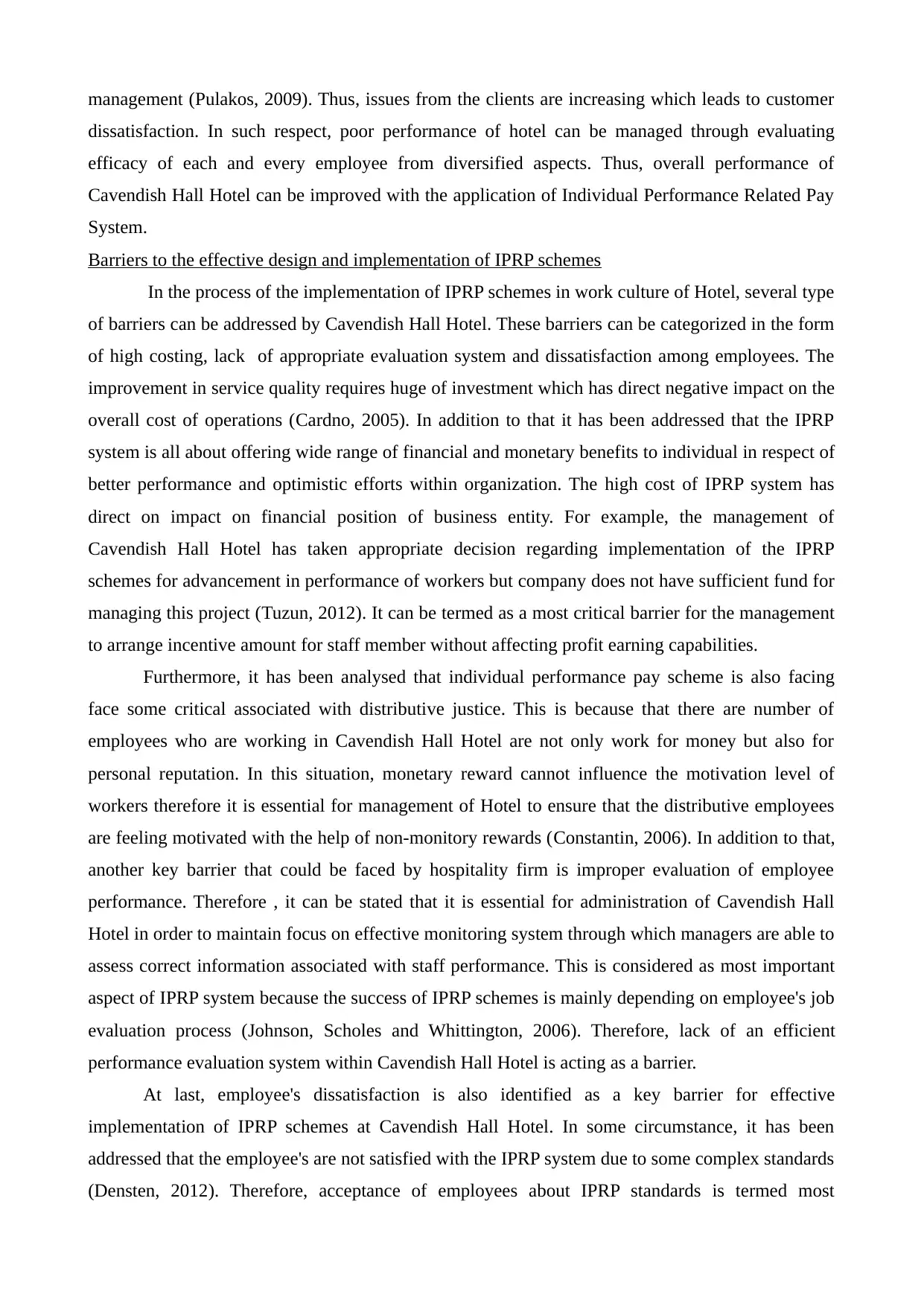
management (Pulakos, 2009). Thus, issues from the clients are increasing which leads to customer
dissatisfaction. In such respect, poor performance of hotel can be managed through evaluating
efficacy of each and every employee from diversified aspects. Thus, overall performance of
Cavendish Hall Hotel can be improved with the application of Individual Performance Related Pay
System.
Barriers to the effective design and implementation of IPRP schemes
In the process of the implementation of IPRP schemes in work culture of Hotel, several type
of barriers can be addressed by Cavendish Hall Hotel. These barriers can be categorized in the form
of high costing, lack of appropriate evaluation system and dissatisfaction among employees. The
improvement in service quality requires huge of investment which has direct negative impact on the
overall cost of operations (Cardno, 2005). In addition to that it has been addressed that the IPRP
system is all about offering wide range of financial and monetary benefits to individual in respect of
better performance and optimistic efforts within organization. The high cost of IPRP system has
direct on impact on financial position of business entity. For example, the management of
Cavendish Hall Hotel has taken appropriate decision regarding implementation of the IPRP
schemes for advancement in performance of workers but company does not have sufficient fund for
managing this project (Tuzun, 2012). It can be termed as a most critical barrier for the management
to arrange incentive amount for staff member without affecting profit earning capabilities.
Furthermore, it has been analysed that individual performance pay scheme is also facing
face some critical associated with distributive justice. This is because that there are number of
employees who are working in Cavendish Hall Hotel are not only work for money but also for
personal reputation. In this situation, monetary reward cannot influence the motivation level of
workers therefore it is essential for management of Hotel to ensure that the distributive employees
are feeling motivated with the help of non-monitory rewards (Constantin, 2006). In addition to that,
another key barrier that could be faced by hospitality firm is improper evaluation of employee
performance. Therefore , it can be stated that it is essential for administration of Cavendish Hall
Hotel in order to maintain focus on effective monitoring system through which managers are able to
assess correct information associated with staff performance. This is considered as most important
aspect of IPRP system because the success of IPRP schemes is mainly depending on employee's job
evaluation process (Johnson, Scholes and Whittington, 2006). Therefore, lack of an efficient
performance evaluation system within Cavendish Hall Hotel is acting as a barrier.
At last, employee's dissatisfaction is also identified as a key barrier for effective
implementation of IPRP schemes at Cavendish Hall Hotel. In some circumstance, it has been
addressed that the employee's are not satisfied with the IPRP system due to some complex standards
(Densten, 2012). Therefore, acceptance of employees about IPRP standards is termed most
dissatisfaction. In such respect, poor performance of hotel can be managed through evaluating
efficacy of each and every employee from diversified aspects. Thus, overall performance of
Cavendish Hall Hotel can be improved with the application of Individual Performance Related Pay
System.
Barriers to the effective design and implementation of IPRP schemes
In the process of the implementation of IPRP schemes in work culture of Hotel, several type
of barriers can be addressed by Cavendish Hall Hotel. These barriers can be categorized in the form
of high costing, lack of appropriate evaluation system and dissatisfaction among employees. The
improvement in service quality requires huge of investment which has direct negative impact on the
overall cost of operations (Cardno, 2005). In addition to that it has been addressed that the IPRP
system is all about offering wide range of financial and monetary benefits to individual in respect of
better performance and optimistic efforts within organization. The high cost of IPRP system has
direct on impact on financial position of business entity. For example, the management of
Cavendish Hall Hotel has taken appropriate decision regarding implementation of the IPRP
schemes for advancement in performance of workers but company does not have sufficient fund for
managing this project (Tuzun, 2012). It can be termed as a most critical barrier for the management
to arrange incentive amount for staff member without affecting profit earning capabilities.
Furthermore, it has been analysed that individual performance pay scheme is also facing
face some critical associated with distributive justice. This is because that there are number of
employees who are working in Cavendish Hall Hotel are not only work for money but also for
personal reputation. In this situation, monetary reward cannot influence the motivation level of
workers therefore it is essential for management of Hotel to ensure that the distributive employees
are feeling motivated with the help of non-monitory rewards (Constantin, 2006). In addition to that,
another key barrier that could be faced by hospitality firm is improper evaluation of employee
performance. Therefore , it can be stated that it is essential for administration of Cavendish Hall
Hotel in order to maintain focus on effective monitoring system through which managers are able to
assess correct information associated with staff performance. This is considered as most important
aspect of IPRP system because the success of IPRP schemes is mainly depending on employee's job
evaluation process (Johnson, Scholes and Whittington, 2006). Therefore, lack of an efficient
performance evaluation system within Cavendish Hall Hotel is acting as a barrier.
At last, employee's dissatisfaction is also identified as a key barrier for effective
implementation of IPRP schemes at Cavendish Hall Hotel. In some circumstance, it has been
addressed that the employee's are not satisfied with the IPRP system due to some complex standards
(Densten, 2012). Therefore, acceptance of employees about IPRP standards is termed most
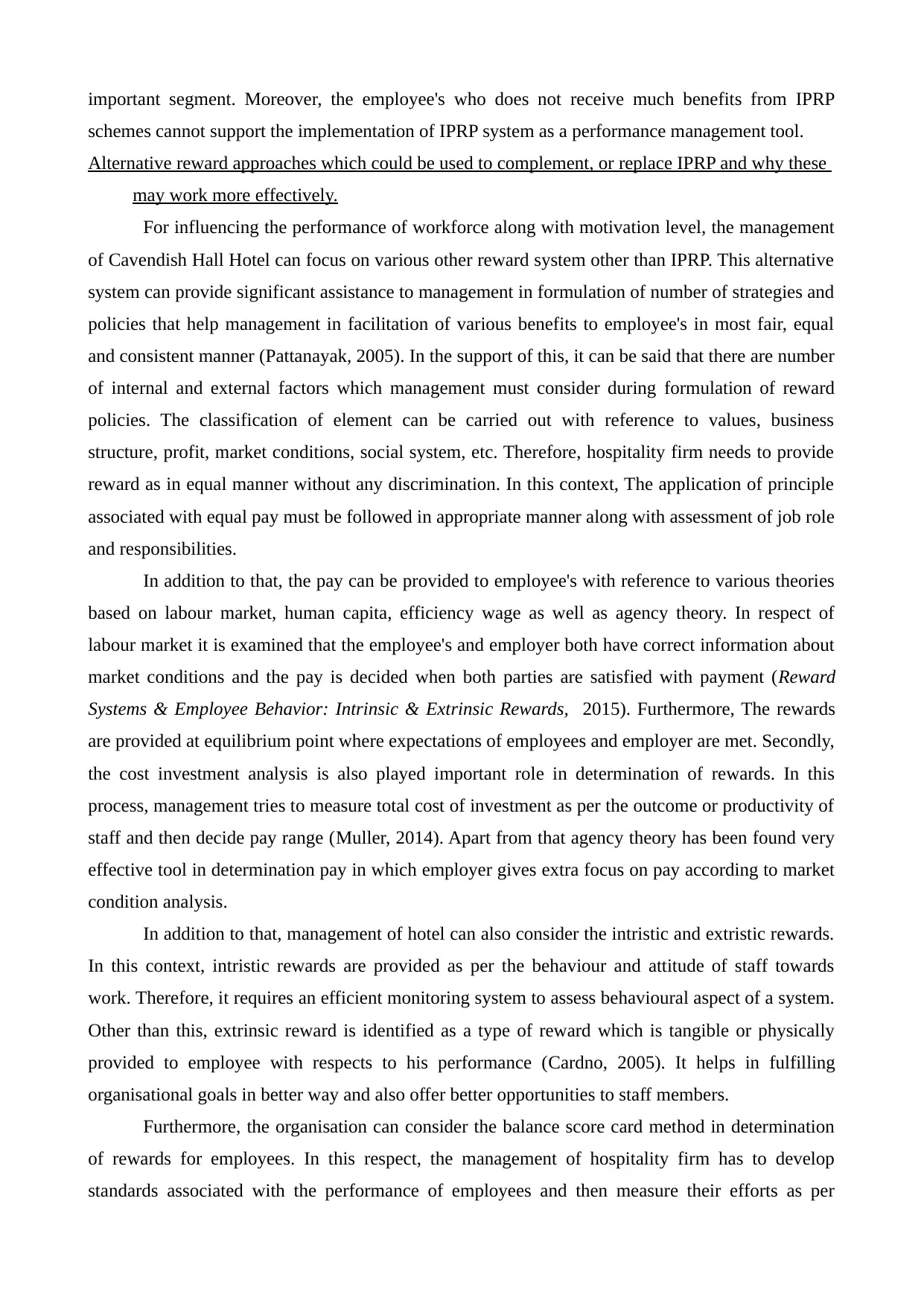
important segment. Moreover, the employee's who does not receive much benefits from IPRP
schemes cannot support the implementation of IPRP system as a performance management tool.
Alternative reward approaches which could be used to complement, or replace IPRP and why these
may work more effectively.
For influencing the performance of workforce along with motivation level, the management
of Cavendish Hall Hotel can focus on various other reward system other than IPRP. This alternative
system can provide significant assistance to management in formulation of number of strategies and
policies that help management in facilitation of various benefits to employee's in most fair, equal
and consistent manner (Pattanayak, 2005). In the support of this, it can be said that there are number
of internal and external factors which management must consider during formulation of reward
policies. The classification of element can be carried out with reference to values, business
structure, profit, market conditions, social system, etc. Therefore, hospitality firm needs to provide
reward as in equal manner without any discrimination. In this context, The application of principle
associated with equal pay must be followed in appropriate manner along with assessment of job role
and responsibilities.
In addition to that, the pay can be provided to employee's with reference to various theories
based on labour market, human capita, efficiency wage as well as agency theory. In respect of
labour market it is examined that the employee's and employer both have correct information about
market conditions and the pay is decided when both parties are satisfied with payment (Reward
Systems & Employee Behavior: Intrinsic & Extrinsic Rewards, 2015). Furthermore, The rewards
are provided at equilibrium point where expectations of employees and employer are met. Secondly,
the cost investment analysis is also played important role in determination of rewards. In this
process, management tries to measure total cost of investment as per the outcome or productivity of
staff and then decide pay range (Muller, 2014). Apart from that agency theory has been found very
effective tool in determination pay in which employer gives extra focus on pay according to market
condition analysis.
In addition to that, management of hotel can also consider the intristic and extristic rewards.
In this context, intristic rewards are provided as per the behaviour and attitude of staff towards
work. Therefore, it requires an efficient monitoring system to assess behavioural aspect of a system.
Other than this, extrinsic reward is identified as a type of reward which is tangible or physically
provided to employee with respects to his performance (Cardno, 2005). It helps in fulfilling
organisational goals in better way and also offer better opportunities to staff members.
Furthermore, the organisation can consider the balance score card method in determination
of rewards for employees. In this respect, the management of hospitality firm has to develop
standards associated with the performance of employees and then measure their efforts as per
schemes cannot support the implementation of IPRP system as a performance management tool.
Alternative reward approaches which could be used to complement, or replace IPRP and why these
may work more effectively.
For influencing the performance of workforce along with motivation level, the management
of Cavendish Hall Hotel can focus on various other reward system other than IPRP. This alternative
system can provide significant assistance to management in formulation of number of strategies and
policies that help management in facilitation of various benefits to employee's in most fair, equal
and consistent manner (Pattanayak, 2005). In the support of this, it can be said that there are number
of internal and external factors which management must consider during formulation of reward
policies. The classification of element can be carried out with reference to values, business
structure, profit, market conditions, social system, etc. Therefore, hospitality firm needs to provide
reward as in equal manner without any discrimination. In this context, The application of principle
associated with equal pay must be followed in appropriate manner along with assessment of job role
and responsibilities.
In addition to that, the pay can be provided to employee's with reference to various theories
based on labour market, human capita, efficiency wage as well as agency theory. In respect of
labour market it is examined that the employee's and employer both have correct information about
market conditions and the pay is decided when both parties are satisfied with payment (Reward
Systems & Employee Behavior: Intrinsic & Extrinsic Rewards, 2015). Furthermore, The rewards
are provided at equilibrium point where expectations of employees and employer are met. Secondly,
the cost investment analysis is also played important role in determination of rewards. In this
process, management tries to measure total cost of investment as per the outcome or productivity of
staff and then decide pay range (Muller, 2014). Apart from that agency theory has been found very
effective tool in determination pay in which employer gives extra focus on pay according to market
condition analysis.
In addition to that, management of hotel can also consider the intristic and extristic rewards.
In this context, intristic rewards are provided as per the behaviour and attitude of staff towards
work. Therefore, it requires an efficient monitoring system to assess behavioural aspect of a system.
Other than this, extrinsic reward is identified as a type of reward which is tangible or physically
provided to employee with respects to his performance (Cardno, 2005). It helps in fulfilling
organisational goals in better way and also offer better opportunities to staff members.
Furthermore, the organisation can consider the balance score card method in determination
of rewards for employees. In this respect, the management of hospitality firm has to develop
standards associated with the performance of employees and then measure their efforts as per
⊘ This is a preview!⊘
Do you want full access?
Subscribe today to unlock all pages.

Trusted by 1+ million students worldwide
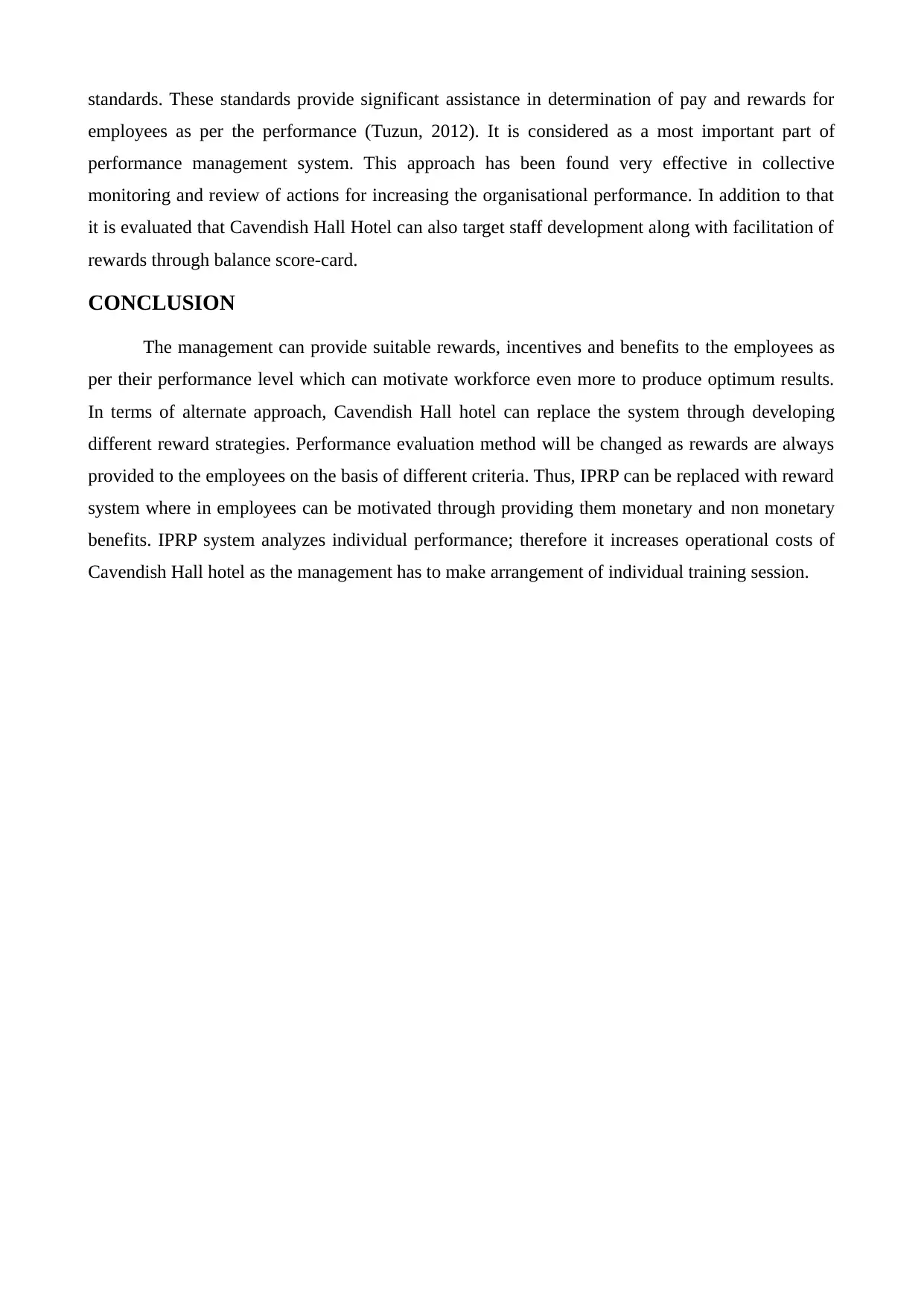
standards. These standards provide significant assistance in determination of pay and rewards for
employees as per the performance (Tuzun, 2012). It is considered as a most important part of
performance management system. This approach has been found very effective in collective
monitoring and review of actions for increasing the organisational performance. In addition to that
it is evaluated that Cavendish Hall Hotel can also target staff development along with facilitation of
rewards through balance score-card.
CONCLUSION
The management can provide suitable rewards, incentives and benefits to the employees as
per their performance level which can motivate workforce even more to produce optimum results.
In terms of alternate approach, Cavendish Hall hotel can replace the system through developing
different reward strategies. Performance evaluation method will be changed as rewards are always
provided to the employees on the basis of different criteria. Thus, IPRP can be replaced with reward
system where in employees can be motivated through providing them monetary and non monetary
benefits. IPRP system analyzes individual performance; therefore it increases operational costs of
Cavendish Hall hotel as the management has to make arrangement of individual training session.
employees as per the performance (Tuzun, 2012). It is considered as a most important part of
performance management system. This approach has been found very effective in collective
monitoring and review of actions for increasing the organisational performance. In addition to that
it is evaluated that Cavendish Hall Hotel can also target staff development along with facilitation of
rewards through balance score-card.
CONCLUSION
The management can provide suitable rewards, incentives and benefits to the employees as
per their performance level which can motivate workforce even more to produce optimum results.
In terms of alternate approach, Cavendish Hall hotel can replace the system through developing
different reward strategies. Performance evaluation method will be changed as rewards are always
provided to the employees on the basis of different criteria. Thus, IPRP can be replaced with reward
system where in employees can be motivated through providing them monetary and non monetary
benefits. IPRP system analyzes individual performance; therefore it increases operational costs of
Cavendish Hall hotel as the management has to make arrangement of individual training session.
Paraphrase This Document
Need a fresh take? Get an instant paraphrase of this document with our AI Paraphraser
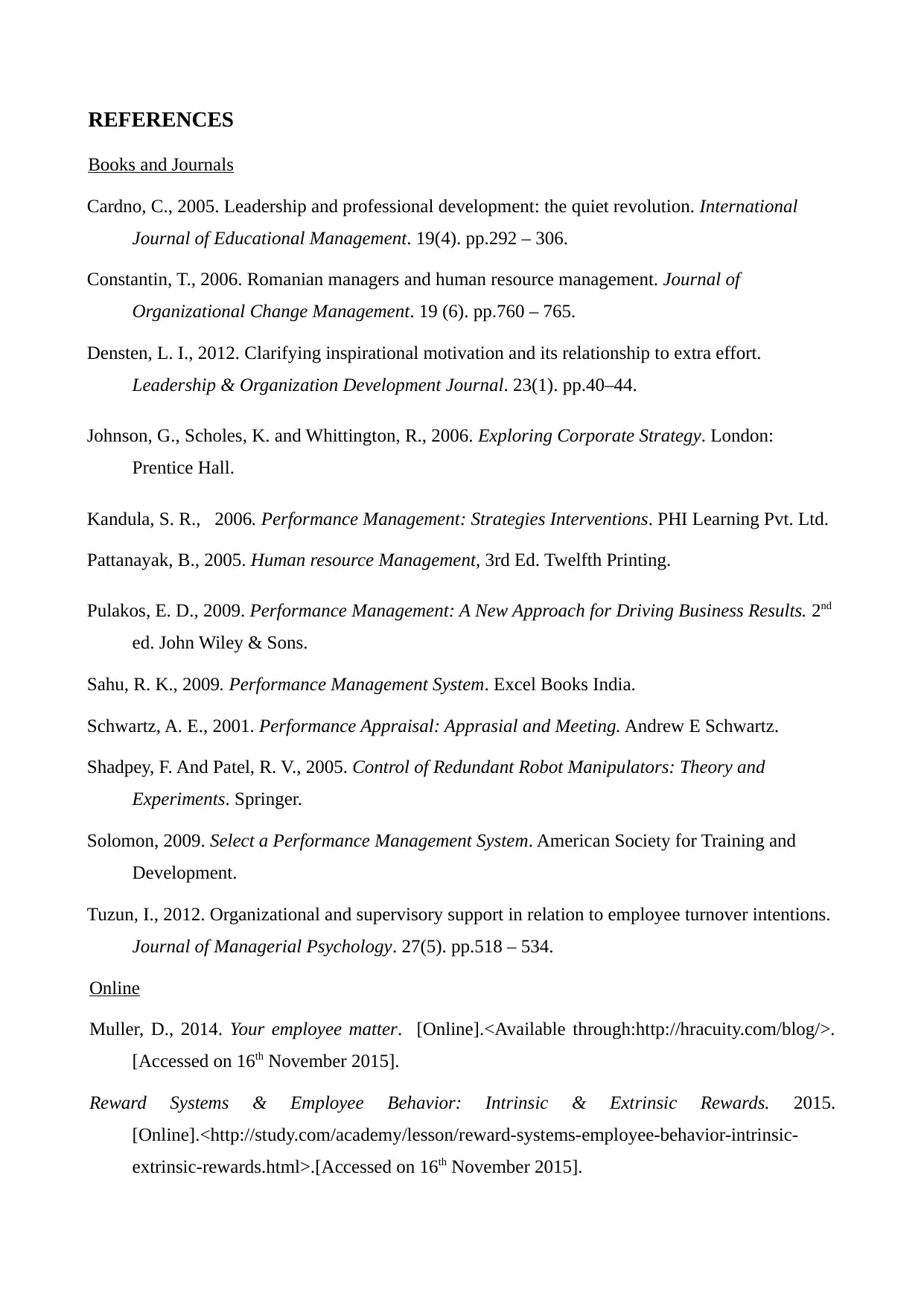
REFERENCES
Books and Journals
Cardno, C., 2005. Leadership and professional development: the quiet revolution. International
Journal of Educational Management. 19(4). pp.292 – 306.
Constantin, T., 2006. Romanian managers and human resource management. Journal of
Organizational Change Management. 19 (6). pp.760 – 765.
Densten, L. I., 2012. Clarifying inspirational motivation and its relationship to extra effort.
Leadership & Organization Development Journal. 23(1). pp.40–44.
Johnson, G., Scholes, K. and Whittington, R., 2006. Exploring Corporate Strategy. London:
Prentice Hall.
Kandula, S. R., 2006. Performance Management: Strategies Interventions. PHI Learning Pvt. Ltd.
Pattanayak, B., 2005. Human resource Management, 3rd Ed. Twelfth Printing.
Pulakos, E. D., 2009. Performance Management: A New Approach for Driving Business Results. 2nd
ed. John Wiley & Sons.
Sahu, R. K., 2009. Performance Management System. Excel Books India.
Schwartz, A. E., 2001. Performance Appraisal: Apprasial and Meeting. Andrew E Schwartz.
Shadpey, F. And Patel, R. V., 2005. Control of Redundant Robot Manipulators: Theory and
Experiments. Springer.
Solomon, 2009. Select a Performance Management System. American Society for Training and
Development.
Tuzun, I., 2012. Organizational and supervisory support in relation to employee turnover intentions.
Journal of Managerial Psychology. 27(5). pp.518 – 534.
Online
Muller, D., 2014. Your employee matter. [Online].<Available through:http://hracuity.com/blog/>.
[Accessed on 16th November 2015].
Reward Systems & Employee Behavior: Intrinsic & Extrinsic Rewards. 2015.
[Online].<http://study.com/academy/lesson/reward-systems-employee-behavior-intrinsic-
extrinsic-rewards.html>.[Accessed on 16th November 2015].
Books and Journals
Cardno, C., 2005. Leadership and professional development: the quiet revolution. International
Journal of Educational Management. 19(4). pp.292 – 306.
Constantin, T., 2006. Romanian managers and human resource management. Journal of
Organizational Change Management. 19 (6). pp.760 – 765.
Densten, L. I., 2012. Clarifying inspirational motivation and its relationship to extra effort.
Leadership & Organization Development Journal. 23(1). pp.40–44.
Johnson, G., Scholes, K. and Whittington, R., 2006. Exploring Corporate Strategy. London:
Prentice Hall.
Kandula, S. R., 2006. Performance Management: Strategies Interventions. PHI Learning Pvt. Ltd.
Pattanayak, B., 2005. Human resource Management, 3rd Ed. Twelfth Printing.
Pulakos, E. D., 2009. Performance Management: A New Approach for Driving Business Results. 2nd
ed. John Wiley & Sons.
Sahu, R. K., 2009. Performance Management System. Excel Books India.
Schwartz, A. E., 2001. Performance Appraisal: Apprasial and Meeting. Andrew E Schwartz.
Shadpey, F. And Patel, R. V., 2005. Control of Redundant Robot Manipulators: Theory and
Experiments. Springer.
Solomon, 2009. Select a Performance Management System. American Society for Training and
Development.
Tuzun, I., 2012. Organizational and supervisory support in relation to employee turnover intentions.
Journal of Managerial Psychology. 27(5). pp.518 – 534.
Online
Muller, D., 2014. Your employee matter. [Online].<Available through:http://hracuity.com/blog/>.
[Accessed on 16th November 2015].
Reward Systems & Employee Behavior: Intrinsic & Extrinsic Rewards. 2015.
[Online].<http://study.com/academy/lesson/reward-systems-employee-behavior-intrinsic-
extrinsic-rewards.html>.[Accessed on 16th November 2015].

⊘ This is a preview!⊘
Do you want full access?
Subscribe today to unlock all pages.

Trusted by 1+ million students worldwide
1 out of 9
Related Documents
Your All-in-One AI-Powered Toolkit for Academic Success.
+13062052269
info@desklib.com
Available 24*7 on WhatsApp / Email
![[object Object]](/_next/static/media/star-bottom.7253800d.svg)
Unlock your academic potential
Copyright © 2020–2026 A2Z Services. All Rights Reserved. Developed and managed by ZUCOL.





